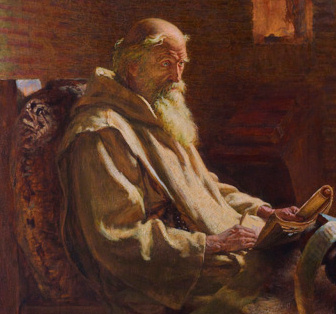
Catena Aurea by St. Thomas Aguinas
CHAP. 12
12:54–57
54. And he said also to the people, When ye see a cloud rise out of the west, straightway ye say, There cometh a shower; and so it is.
55. And when ye see the south wind blow, ye say, There will be heat; and it cometh to pass.
56. Ye hypocrites, ye can discern the face of the sky and of the earth; but how is it that ye do not discern this time?
57. Yea, and why even of yourselves judge ye not what is right?
THEOPHYLACT. When He spoke about preaching, and called it a sword, His hearers may have been troubled, not knowing what He meant. And therefore our Lord adds, that as men determine the state of the weather by certain signs, so ought they to know His coming. And this is what he means by saying, When ye see a cloud rise out of the west, straightway ye say, There cometh a shower. And when ye see the south wind blowing, ye say, There will be heat, &c. As if He says, Your words and works shew me to be opposed to you. Ye may therefore suppose that I came not to give peace, but the storm and whirlwind. For I am a cloud, and I come out of the west, that is, from human nature; which has been long since clothed with the thick darkness of sin. I came also to send fire, that is, to stir up heat. For I am the strong south wind, opposed to the northern coldness.
BEDE. 
Or, they who from the change of the elements can easily when they like predetermine the state of the weather, might if they wished also understand the time of our Lord’s coming from the words of the Prophets.
CYRIL OF ALEXANDRIA. 
For the prophets have in many ways foretold the mystery of Christ; it became them therefore, if they were wise, to stretch their prospect beyond to the future, nor will ignorance of the time to come avail them after the present life. For there will be wind and rain, and a future punishment by fire; and this is signified when it is said, A shower cometh. It became them also not to be ignorant of the time of salvation, that is, the coming of the Saviour, through whom perfect piety entered into the world. And this is meant when it is said, Ye say that there will be heat. Whence it follows in censure of them, Ye hypocrites, ye can discern the face of the sky and the earth, but how is it that ye do not discern this time?
BASIL. (in Hexam. Hom. 6, 4.) Now we must observe, that conjectures concerning the stars are necessary to the life of man, as long as we do lot push our searches into their signs beyond due limits. For it is possible to discover some things with respect to coming rain, still more concerning heat and the force of the winds, whether partial or universal, stormy or gentle. But the great advantage that is rendered to life by these conjectures is known to every one. For it is of importance to the sailor to prognosticate the dangers of storms, to the traveller the changes of the weather, to the husbandman the abundant supply of his fruits.
BEDE. 
But lest any of the people should allege their ignorance of the prophetical books as a reason why they could not discern the courses of the times, He carefully adds, And why even of yourselves judge ye not what is right, shewing them that although unlearned they might still by their natural ability discern Him, who did works such as none other man did, to be above man, and to be God, and that therefore after the injustice of this world, the just judgment of the creation would come.
ORIGEN. But had it not been implanted in our nature to judge what is right, our Lord would never have said this.
12:58–59
58. When thou goest with thine adversary to the magistrate, as thou art in the way, give diligence that thou mayest be delivered from him; lest he hale thee to the judge, and the judge deliver thee to the officer, and the officer cast thee into prison.
59. I tell thee, thou shalt not depart thence, till thou hast paid the very last mite.
THEOPHYLACT. Our Lord having described a rightful difference, next teaches us a rightful reconciliation, saying, When thou goest with thine adversary to the magistrate, as thou art in the way, give diligence that thou mayest be delivered from him, &c. As if He says, When thine adversary is bringing thee to judgment, give diligence, that is, try every method, to be released from him. Or give diligence, that is, although thou hast nothing, borrow in order that thou may be released from him, lest he summon thee before the judge, as it follows, Lest he hale thee to the judge, and the judge deliver thee to the officer, and the officer cast thee into prison.
CYRIL OF ALEXANDRIA.
Where thou wilt suffer want until thou payest the last farthing; and this is what He adds, I say unto you, thou shalt not depart hence.
CHRYSOSTOM. 
(Hom. 16. in Matt.) It seems to me that He is speaking of the present judges, and of the way to the present judgment, and of the prison of this world. For by these things which are visible and at hand, ignorant men are wont to gain improvement. For often He gives a lesson, not only from future good and evil but from present, for the sake of His ruder hearers.
AMBROSE. Or our adversary is the devil, who lays his baits for sin, that he may have those his partners in punishment who were his accomplices in crime; our adversary is also every vicious practice. Lastly, our adversary is an evil conscience, which affects us both in this world, and will accuse and betray us in the next. Let us then give heed, while we are in this life’s course, that we may be delivered from every bad act as from an evil enemy. Nay, while we are going with our adversary to the magistrate, as we are in the way, we should condemn our fault. But who is the magistrate, but He in whose hands is all power? But the Magistrate delivers the guilty to the Judge, that is, to Him, to whom He gives the power over the quick and dead, namely, Jesus Christ, through Whom the secrets are made manifest, and the punishment of wicked works awarded. He delivers to the officer, and the officer casts into prison, for He says, Bind him hand and foot, and cast him into outer darkness. (Matt. 22:12.) And he shews that His officers are the angels, of whom he says, The angels shall come forth, and sever the wicked from among the just, and shall cast them into the furnace of fire; (Matt. 13:49.) but it is added, I tell thee, thou shalt not depart thence till thou hast paid the very last mite. For as they who pay money on interest do not get rid of the debt of interest before that the amount of the whole principal is paid even up to the least sum in every kind of payment, so by the compensation of love and the other acts, or by each particular kind of satisfaction the punishment of sin is cancelled.
ORIGEN. Or else, He here introduces four characters, the adversary, the magistrate, the officer, and the judge. But with Matthew the character of the magistrate is left out, and instead of the officer a servant is introduced. They differ also in that the one has written a farthing, the other a mite, but each has called it the last. Now we say that all men have present with them two angels, a bad one who encourages them to wicked deeds, a good one who persuades all that is best. Now the former, our adversary whenever we sin rejoices, knowing that he has an occasion for exultations and boasting with the prince of the world, who sent him. But in the Greek, “the adversary” is written with the article, to signify that he is one out of many, seeing that each individual is under the ruler of his nation. Give diligence then that you may be delivered from your adversary, or from the ruler to whom the adversary drags you, by having wisdom, justice, fortitude, and temperance. But if you have given diligence, let it be in Him who says, I am the life, (John 14:6.) otherwise the adversary will hale thee to the judge. Now he says, hale, to point out that they are forced unwillingly to condemnation. But I know no other judge but our Lord Jesus Christ who delivers to the officer. Each of us have our own officers; the officers exercise rule over us, if we owe any thing. If I paid every man every thing, I come to the officers and answer with a fearless heart, “I owe them nothing.” But if I am a debtor, the officer will cast me into prison, nor will he suffer me to go out from thence until I have paid every debt. For the officer has no power to let me off even a farthing. He who forgave one debtor five hundred pence and another fifty, (Luke 7:41.) was the Lord, but the exactor is not the master, but one appointed by the master to demand the debts. But the last mite he calls slight and small, for our sins are either heavy or slight. Happy then is he who sinneth not, and next in happiness he who has sinned slightly. Even among slight sins there is diversity, otherwise he would not say until he has paid the last mite. For if he owes a little, he shall not come out till he pays the last mite. But he who has been guilty of a great debt, will have endless ages for his payment.
BEDE. 
Or else, our adversary in the way is the word of God, which opposes our carnal desires in this life; from which he is delivered who is subject to its precepts. Else he will be delivered to the judge, for of contempt of God’s word the sinner will be accounted guilty in the judgment of the judge. The judge will deliver him to the officer, that is, the evil spirit for punishment. He will then be cast into prison, that is, to hell, where because he will ever have to pay the penalty by suffering, but never by paying it obtain pardon, he will never come out from thence, but with that most terrible serpent the devil, will expiate everlasting punishment.